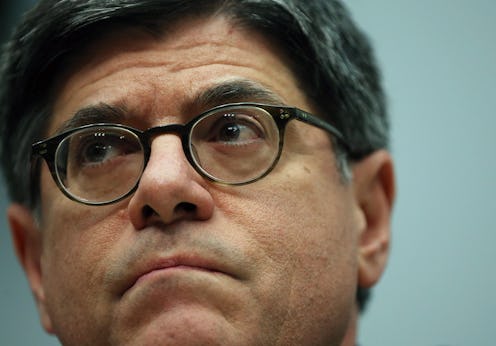News
How The Debt Ceiling Debate is Different This Time
In a New York Times interview Tuesday, Treasury Secretary Jack Lew was explicit about debt limit negotiations. When asked whether dollar-for-dollar spending cuts or the defunding of healthcare (in exchange for a rise in the debt limit) were nonstarters, Lew replied, "[T]he president has been very clear. We are not going to be negotiating over the debt limit."
As Slate points out, getting pulled into negotiations over raising the debt ceiling in 2011 was one of the biggest mistakes the Obama administration has made. Why? First, because the limit doesn't deal with new spending — raising it allows the executive branch to pay bills Congress has already authorized it to pay. It's illegal not to pay these bills. It's also illegal to collect extra tax money. If Congress doesn't raise the debt limit, it also becomes illegal to borrow money to pay the gap between the limit and previously authorized spending.
The refusal to raise the debt ceiling essentially amounts to a refusal to pay what the country already owes, which is something Washington has so far managed to avoid doing.
So, even though congressional Republicans have used the threat of not raising the debt ceiling as a bargaining chip, doing so is not an Obama administration priority — it's policy that needs to be enacted so the federal government can make payments it already owes.
According to a letter written by Lew to Congressional leaders, the U.S. government will no longer be legally allowed to issue more debt come mid-October. Then, the Treasury will run out of the "extraordinary measures" it has taken on in order to avoid going over the Congressionally-imposed limit on total federal debt of $16.7 trillion that was set in May.
"Congress should act as soon as possible to protect America's good credit by extending normal borrowing authority well before any risk of default becomes imminent," Lew said in the letter.
If Congress refuses to do so, maintaining the current debt ceiling would likely mean higher interest rates — not to mention confusion and panic in markets around the world. Hooray!
And yet, Speaker of the House John Boehner said a week ago that the House would not vote to raise the debt ceiling without also instituting spending cuts; a demonstrably flawed negotiation tactic.
"We're not going to raise the debt ceiling without real cuts in spending. It's as simple as that," he said at a press conference.
Fairness and reason in a nutshell.
